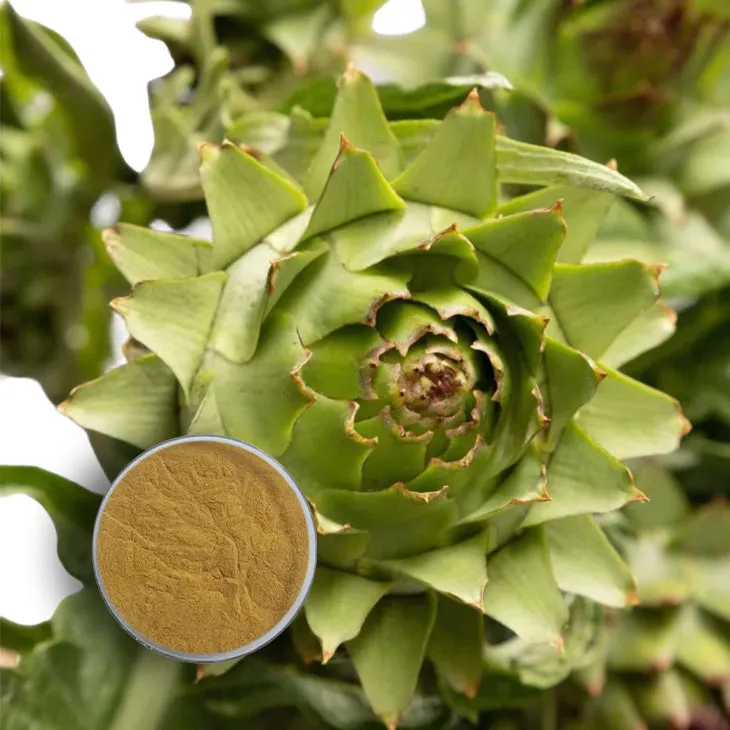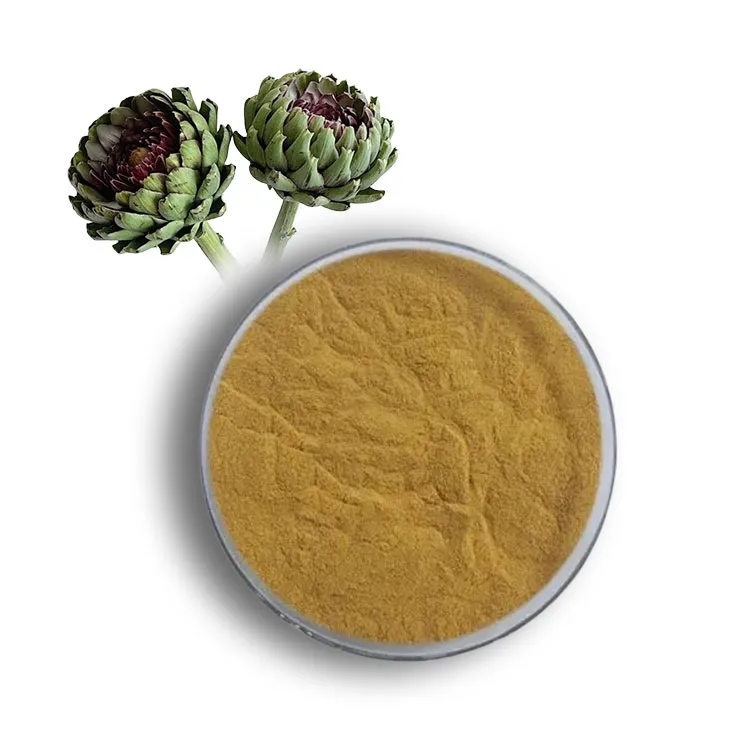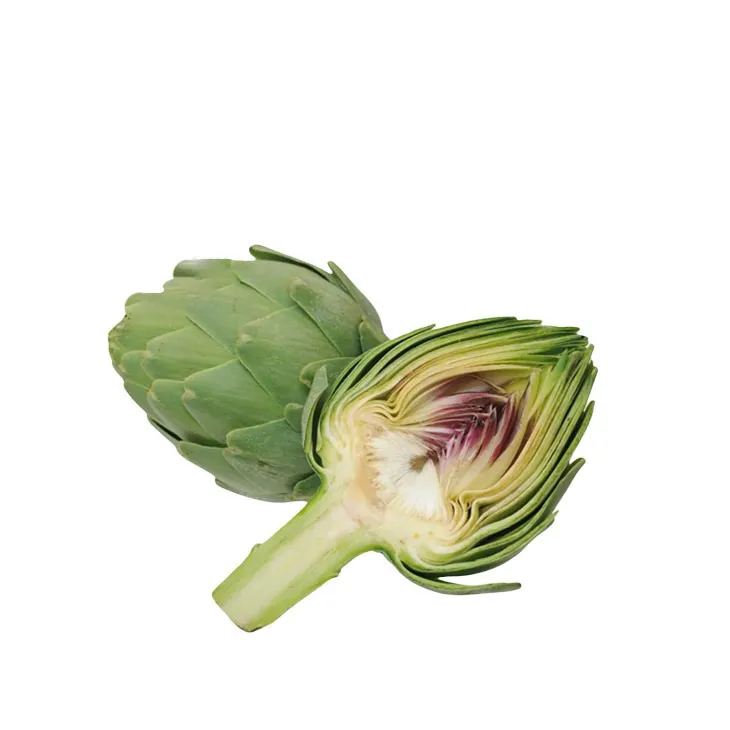- 0086-571-85302990
- sales@greenskybio.com
Seven Trends of Artichoke Leaf Extract.
2024-12-14

1. Introduction to Artichoke Leaf Extract
Artichoke (Cynara scolymus) is a plant that has been used for centuries, both in cooking and for its potential health benefits. The Artichoke Leaf Extract is a concentrated form of the active compounds found in the leaves of this plant. It contains a variety of bioactive substances, such as cynarin, chlorogenic acid, and flavonoids. These components are believed to be responsible for many of the extract's observed effects.

2. Trend 1: Growing Interest in Medicinal Applications
Digestive Health
- Artichoke Leaf Extract has shown promise in promoting digestive health. It can stimulate the production of bile, which is essential for the breakdown and absorption of fats. Bile also helps in the elimination of toxins from the body. For example, in some studies, patients with indigestion or bloating experienced relief after taking artichoke leaf extract supplements.
- It may also have a beneficial effect on the liver. The liver is a key organ in the body's detoxification process, and Artichoke Extract could support its function by protecting liver cells from damage and promoting the regeneration of liver tissue.
- Research suggests that artichoke leaf extract may contribute to cardiovascular health. It has been shown to have antioxidant properties, which can help reduce oxidative stress in the blood vessels. Oxidative stress is associated with the development of atherosclerosis, a condition where plaque builds up in the arteries.
- Some studies indicate that the extract may also help in reducing blood pressure. By relaxing the blood vessels and improving blood flow, it can potentially lower the risk of heart disease and stroke.

3. Trend 2: Incorporation in Nutritional Supplements
Multivitamin and Herbal Blends
- Artichoke leaf extract is increasingly being incorporated into multivitamin and herbal supplement formulations. These supplements are designed to provide a comprehensive range of nutrients and botanicals to support overall health. The addition of Artichoke Extract adds to the value of these products, especially for those interested in digestive and cardiovascular support.
- Manufacturers are also promoting artichoke - containing supplements as a natural alternative to some pharmaceutical drugs. For example, for individuals who want to manage mild digestive issues without relying on over - the - counter medications, artichoke - based supplements may be a viable option.
- There are now targeted nutritional supplements that focus specifically on the benefits of artichoke leaf extract. These products are often marketed towards individuals with specific health concerns, such as those with a family history of heart disease or liver problems. They may contain higher concentrations of Artichoke Extract along with other complementary ingredients to enhance its effectiveness.

4. Trend 3: Research in Anti - Inflammatory Properties
Inflammatory Response and Chronic Diseases
- Chronic inflammation is associated with a variety of diseases, including arthritis, diabetes, and certain cancers. Artichoke leaf extract has been the subject of research regarding its anti - inflammatory properties. The bioactive compounds in the extract, such as flavonoids, are thought to modulate the body's inflammatory response.
- In pre - clinical studies, artichoke extract has been shown to reduce the production of inflammatory cytokines, which are molecules that play a key role in the inflammatory process. This reduction in cytokine production could potentially slow down the progression of chronic inflammatory diseases.
- Autoimmune disorders occur when the body's immune system attacks its own tissues. Some researchers believe that artichoke leaf extract may have a role in managing autoimmune conditions. By regulating the immune system and reducing inflammation, it could potentially alleviate some of the symptoms associated with autoimmune diseases, although more research is needed in this area.
5. Trend 4: Use in Cosmetic and Skin Care Products
Antioxidant and Anti - Aging Effects
- Artichoke leaf extract is rich in antioxidants, which are highly valued in the cosmetic industry. These antioxidants can protect the skin from damage caused by free radicals, such as those from environmental pollutants and UV radiation. By neutralizing free radicals, artichoke extract can help prevent premature aging of the skin, including the formation of wrinkles and fine lines.
- Some skin care products containing artichoke extract claim to improve skin elasticity and firmness. This may be due to the extract's ability to stimulate collagen production in the skin. Collagen is a protein that provides structure and support to the skin, and as we age, its production naturally declines.
- The anti - inflammatory properties of artichoke leaf extract may also be beneficial for acne - prone skin. It can help reduce inflammation associated with acne breakouts and soothe irritated skin. Additionally, artichoke extract may have antibacterial properties, which can help keep the skin clean by inhibiting the growth of acne - causing bacteria.
6. Trend 5: Expansion in the Food and Beverage Industry
Functional Foods
- Artichoke - based functional foods are becoming more popular. These foods are designed to provide not only basic nutrition but also additional health benefits. For example, artichoke - flavored spreads or dips may contain artichoke leaf extract, which can offer digestive and antioxidant benefits to consumers.
- Some food manufacturers are exploring the use of artichoke extract in the development of health - promoting snacks. These snacks could target consumers who are health - conscious and looking for convenient, nutritious options.
- In the beverage industry, artichoke leaf extract is being used in new and innovative ways. There are artichoke - based teas and herbal infusions that are marketed for their potential health benefits, such as promoting digestion and providing a sense of relaxation. Some energy drinks are also incorporating artichoke extract as a natural ingredient to provide a boost of energy without relying solely on synthetic stimulants.
7. Trend 6: Sustainable Sourcing and Production
Environmental Considerations
- As the demand for artichoke leaf extract grows, there is an increasing focus on sustainable sourcing. Artichoke plants are typically grown in regions with suitable climates, such as the Mediterranean. However, to ensure the long - term availability of artichoke resources, sustainable farming practices are being promoted. These include reducing water usage, minimizing the use of pesticides, and protecting natural habitats.
- Some companies are also exploring ways to use waste products from artichoke processing. For example, the outer leaves and stems of artichokes, which are often discarded during the extraction process, could potentially be used for other purposes, such as in composting or in the production of biofuels.
- Fair trade practices are becoming more important in the artichoke leaf extract industry. This ensures that farmers and workers involved in artichoke production are paid fairly for their labor. It also promotes social and economic development in the regions where artichokes are grown. By supporting fair trade, consumers can contribute to the well - being of these communities while also obtaining high - quality artichoke leaf extract products.
8. Trend 7: Regulatory and Quality Control
Regulatory Frameworks
- As artichoke leaf extract is increasingly used in various products, regulatory authorities around the world are paying more attention to its safety and efficacy. Different countries have different regulatory frameworks for herbal products, and artichoke extract is no exception. In some regions, it may be classified as a dietary supplement, while in others, it may be subject to more stringent regulations similar to those for pharmaceuticals.
- The regulatory process often involves evaluating the quality, purity, and dosage of artichoke extract products. This is to ensure that consumers are protected from potential harm and that the products actually deliver the claimed benefits.
- Manufacturers are implementing strict quality control measures to meet regulatory requirements and to ensure the consistency and quality of their artichoke leaf extract products. These measures include testing for contaminants, such as heavy metals and pesticides, as well as verifying the identity and potency of the active compounds in the extract.
- Standardization of artichoke leaf extract is also an important aspect of quality control. This involves establishing specific criteria for the composition and concentration of the extract, which can help in ensuring the reproducibility of its effects in different products.
9. Conclusion
Artichoke leaf extract is an emerging and versatile ingredient with significant potential in multiple fields. The seven trends discussed, from its medicinal applications to its use in cosmetics and the importance of sustainable sourcing and regulatory control, highlight the growing importance of this natural extract. As research continues and consumer awareness increases, artichoke leaf extract is likely to play an even more prominent role in promoting health, beauty, and sustainable development in the future.
FAQ:
1. What are the main components of artichoke leaf extract?
The main components of artichoke leaf extract include cynarin, chlorogenic acid, and flavonoids. Cynarin is one of the characteristic compounds, which has certain biological activities. Chlorogenic acid also contributes to its antioxidant and other properties, and flavonoids play a role in various physiological functions.
2. How does artichoke leaf extract benefit health in the field of medicine?
In medicine, artichoke leaf extract may have several benefits. It has been studied for its potential to support liver health, as it may help in the detoxification process. It may also have a positive impact on digestion by promoting bile production and improving gastrointestinal function. Additionally, some research suggests that it could have anti - inflammatory properties, which might be beneficial for conditions related to inflammation.
3. What role does artichoke leaf extract play in nutrition?
Artichoke leaf extract can play an important role in nutrition. It is rich in antioxidants, which can help protect cells from oxidative damage. These antioxidants may also contribute to overall health and potentially reduce the risk of chronic diseases. Moreover, it may support healthy digestion, which is crucial for the proper absorption of nutrients from food.
4. Are there any side effects of using artichoke leaf extract?
While artichoke leaf extract is generally considered safe for most people when used appropriately, some individuals may experience mild side effects. These can include gastrointestinal discomfort such as bloating, gas, or an upset stomach. In rare cases, allergic reactions may occur. It is important to follow the recommended dosage and consult a healthcare provider if one has any pre - existing medical conditions or is taking other medications.
5. How is artichoke leaf extract produced?
Artichoke leaf extract is typically produced through a process of extraction. First, the artichoke leaves are harvested. Then, they are often dried and ground into a fine powder. After that, solvents such as ethanol or water are used to extract the active compounds from the powdered leaves. The resulting liquid is then processed further to obtain a concentrated extract, which can be in the form of a powder, tincture, or capsule.
Related literature
- The Health Benefits of Artichoke Leaf Extract: A Review"
- "Artichoke Leaf Extract: Chemical Composition and Potential Therapeutic Applications"
- "Nutritional and Medicinal Aspects of Artichoke (Cynara scolymus L.) Leaf Extract"
- ▶ Hesperidin
- ▶ citrus bioflavonoids
- ▶ plant extract
- ▶ lycopene
- ▶ Diosmin
- ▶ Grape seed extract
- ▶ Sea buckthorn Juice Powder
- ▶ Beetroot powder
- ▶ Hops Extract
- ▶ Artichoke Extract
- ▶ Reishi mushroom extract
- ▶ Astaxanthin
- ▶ Green Tea Extract
- ▶ Curcumin Extract
- ▶ Horse Chestnut Extract
- ▶ Other Problems
- ▶ Boswellia Serrata Extract
- ▶ Resveratrol Extract
- ▶ Marigold Extract
- ▶ Grape Leaf Extract
- ▶ blog3
- ▶ blog4
- ▶ blog5
-
Pure 85% Tomentil Extract.
2024-12-14
-
Shikonin
2024-12-14
-
Acai Berry Extract
2024-12-14
-
Stevia Extract
2024-12-14
-
Shikone Extract
2024-12-14
-
Eucommia Ulmoides Extract
2024-12-14
-
Acerola Juice Powder
2024-12-14
-
Rosemary extract
2024-12-14
-
Mango flavored powder
2024-12-14
-
Curcuma Longa Extract/Turmeric extract
2024-12-14
-
Curcumin Extract
2024-12-14





















